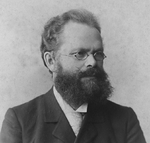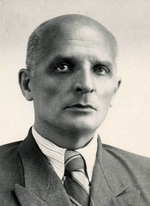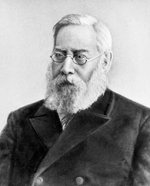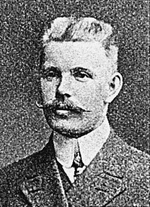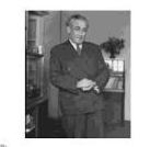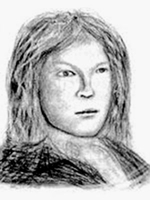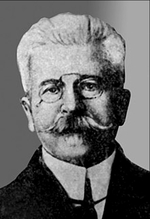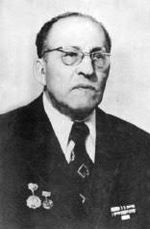Articles
Lashkarev Petr (1833 or 1834–1899)
Lashkarev Petr (1833 or 1834–1899) – historian of canonic law and ecclesiastic architecture.
He was born in the family of a priest, studied at the Belgorod Spiritual School, then – at the Kursk Spiritual Seminary (1849-1855). As the best pupil, he was sent to the Kievan Spiritual Academy (1855-1859), and graduated from it with the Master degree. In 1859, he was elected for Bachelor of the Chair of Canonic Law and Ecclesiastic Archeology. In 1860-1861, he was Ass. Inspector; in 1861-1869 – Ass. Librarian; in 1861-1862 – Teacher in the Basic Theology; since 1866 – Ass. Professor at the same chair.
Read More
Latyshev Vasily (1855–1921)
Latyshev Vasily (1855–1921) – philologist, specialist in classical studies and epigraphic, archeologist.
He lost his father rather early and was brought up by his godfather, a clerk from the Tevr’ Gov.; since 1864, he lived in Grodno. In 1865-1872, he learnt in a gymnasium in Grodno, and finished it with the silver medal. Then he was sent with a scholarship to the St. Petersburg Historical and Philological Institute, where they prepared gymnasium teachers in humanitarian disciplines. There L. was interested in epigraphic. In 1876, he graduated from the institute and taught in a gymnasium in Vilno till 1880; then he went to Greece for his further education; there he studied epigraphic under the supervision of W. Koeler and P. Foucart. In 1882, he was invited to work at the complex of Greek and Latin inscriptions from the Northern Coast of the Black Sea.
Read More
Lavrov Leonid (1909–1982)
Lavrov Leonid (1909–1982) – ethnographer, specialist in Caucasian studies.
In 1928, after the Kuban’ Teachers-Training Institute, he entered the Geographical Faculty of the Leningrad State University (among his supervisors were A. N. Genko, I. I. Meshchaninov, N. I. Kareev); but in 1931, he was excluded ‘for hidden social origin’. In 1935, he graduated from the Leningrad Institute of Philosophy, Literature and History by correspondence. In 1936-1941, he worked at the Institute of Ethnography. In 1941-1942, he was in the Army; he was wounded in 1942; later, in 1942-1946, he taught at military schools of the Arkhangelsk, and Petrozavodsk Military Districts.
In 1946-1982, he worked at the Leningrad Branch of the Institute of Ethnography of the Ac. of Sc. of the U.S.S.R.; in 1973-1982 – Head of the Sector of Ethnography of the Peoples of the Caucasus, Middle Asia and Kazakhstan.
Read More
Lavrov Petr (1823–1900)
Lavrov Petr (1823–1900) – philosopher, sociologist, publicist, historian of religion, participant in the revolutionary movement, theorist of revolutionary Narodnichestvo.
He graduated from the St. Petersburg Artillery School in 1842. He taught Mathematics at military schools in St. Petersburg. In 1858, he was promoted to Colonel, got the academic title of Professor.
He was also engaged in literary work, wrote articles on Physics, Mathematics, Military sciences, Philosophy. Since 1857, he published articles in the magazines: ‘Otechestvennye zapiski’, ‘Biblioteka dlya chteniya’, ‘Russkoe slovo’, and also for ‘Kolokol’ edited by A.I. Herzen.
In April 1866, he was arrested for participation in the secret society ‘Land and Freedom’; in 1867, he was exiled to Totma, and then to the Vologda Province. In February 1870, he fled exile and emigrated to France. In 1871, he took part in the Paris Commune.
Read More
Lebedev Aleksey (1845‒1908)
Lebedev Aleksey (1845‒1908) – historian of the Church, specialist in the Byzantine studies.
He was born in the family of a priest, learnt at the Perervinskoe Spiritual School, and at the Moscow Seminary. In 1870, he graduated from the Moscow Spiritual Academy and started to work there, teaching ecclesiastic history. Since 1875, he was Ass. Professor; since 1879 – Full Professor; he worked there till 1905.
At the defense of his Doctor thesis ‘Ecumenical Councils of the Fourth and Fifth centuries: A Survey of Their Dogmatic Activity in the Context of the Trends of the Schools of Alexandria and Antiochia’, there was a scandal mentioned in the media.
Read More
Lensu Jakob (1884–1937)
Lensu Jakob (1884–1937) – linguist, ethnographer.
He was born in the vil. of Kuz’molovo (Finn. Kuismala) of the St. Petersburg Gov.; he graduated from the Lutheran Seminary in the vil. of Small Kolpany (Kolpino); then he worked as school teacher. On October 23, 1928, he was elected for the Russian-Finnish Section of the Commission on Studying Tribal Consist of the Population of the U.S.S.R.; he became Deputy Chairman of the Leningrad Society of Researchers of Culture of Finno-Ugric Peoples. In 1928, in the vil. of Kuz’molovo, he gathered a collection of objects, including female hats ‘Khuntu’, and gifted it to the Ethnographical Department of the State Russian Museum (coll. 4762, No 7). In 1927, 1929, and 1931, he participated in expeditions for studying language and culture of Finno-Ugric Peoples (Votes, Izhora, Finns, etc.). who lived on the Karelia Isthmus, including Kotelskaya Volost’, Kuivazovsky and Pargolovsky Districts of the Leningrad Region. In the spring of 1931, he worked at the Izhora expedition, headed by V. S. Dubov. In 1930-s, he worked at several industrial plants.
Read More
Lentzman Yakov (1908–1967)
Lentzman Yakov (1908–1967) – specialist in classical studies, historian of religion.
In 1926, he finished a classical gymnasium in Warsaw; then he studied at the courses for teachers the primary schools during a year. After two years work in a Hebrew school, he enrolled to the Physical and Mathematical Faculty of the University of Warsaw (1929); after a year he transferred ate the Historical and Philosophical Faculty. Since the age of 17 he took part in political activity on the left wing. In 1925, he became a member of the Communist Union of Polish Youth; in 1929, he became a member of the Polish Communist Party. Active underground activity led him to the arrest in 1930. He was released on bail, but with the support of the Central Committee of the Polish Communist Party he ran away to Danzig, and in 1932 – to the U.S.S.R.
Read More
Lindenau Jacob Johann (Yakov Pavlovich) (1700–1795)
Lindenau Jacob Johann (Yakov Pavlovich) (1700–1795) – Russian discoverer of Siberia and Far East, and ethnographer.
He was born in Russia in a German family (his father had Swedish citizenship). In 1730, he left Russia to study in Hamburg and Lubeck. In 1737-1746, he participated in the Second Kamchatka expedition. He made geographical and ethnographical descriptions of certain territories and peoples of Siberia; later he got some administrative positions in the Irkutsk Region, in the Siberian Gov.
Read More
Liubovich Nickolay (1855–1935)
Liubovich Nickolay (1855–1935) – historian of Protestantism.
He learnt at the First Kievan gymnasium, then he studied at the Historical and Philological Faculty of the Kievan St Vladimir University. In the course of those studies, he wrote a work on the history of the revolution in the Netherlands. In 1883, he defended his Master thesis ‘The History of the Reformation in Poland: Calvinists and Antitrinitarian’; after it, he got a position of Docent in the World History at the University of Warsaw. Later he became Dean of the Historical and Philological Faculty of the Kievan University. In 1890, he defended his Doctor thesis, awarded with the Macarius Award: ‘The Beginning of the Catholic Reaction and the Decline of the Reformation in Poland’. Since 1924 – Correspondent Member of the Ac. of Sc. He worked at the Rostov (North Caucasian) University. He was arrested and died in prison in 1935 (there are other dates: 1933, 1938); rehabilitated.
Read More
Livshitz Giler (1909–1983)
Livshitz Giler (1909–1983) – specialist in classical antiquities, orientalist, historian of religion.
In 1927, after secondary school, he worked as carpenter at the Minsk house-building factory. In 1931, he entered the Belorussian State High Teachers-Training Institute to get economical education, and after it entered the post-graduate courses at the Chair of the World History. In 1939, he defended his Candidate thesis on the social and political struggle in Rome of 60-s, and the Catilina Plot (it was the first Candidate defense in the World History in the B.S.S.R.); in 1940, he became the first Docent in the World History in the B.S.S.R. In July-October 1941, he was in the Army; then he was demobilized because of the state of his health and evacuated. In 1942-1944, he was Docent in the World History of the Kzyl-Orda Teachers-Training Institute (now Kyzylorda) in Kazakhstan.
Read More
Showing 151-160 of 351 items.


